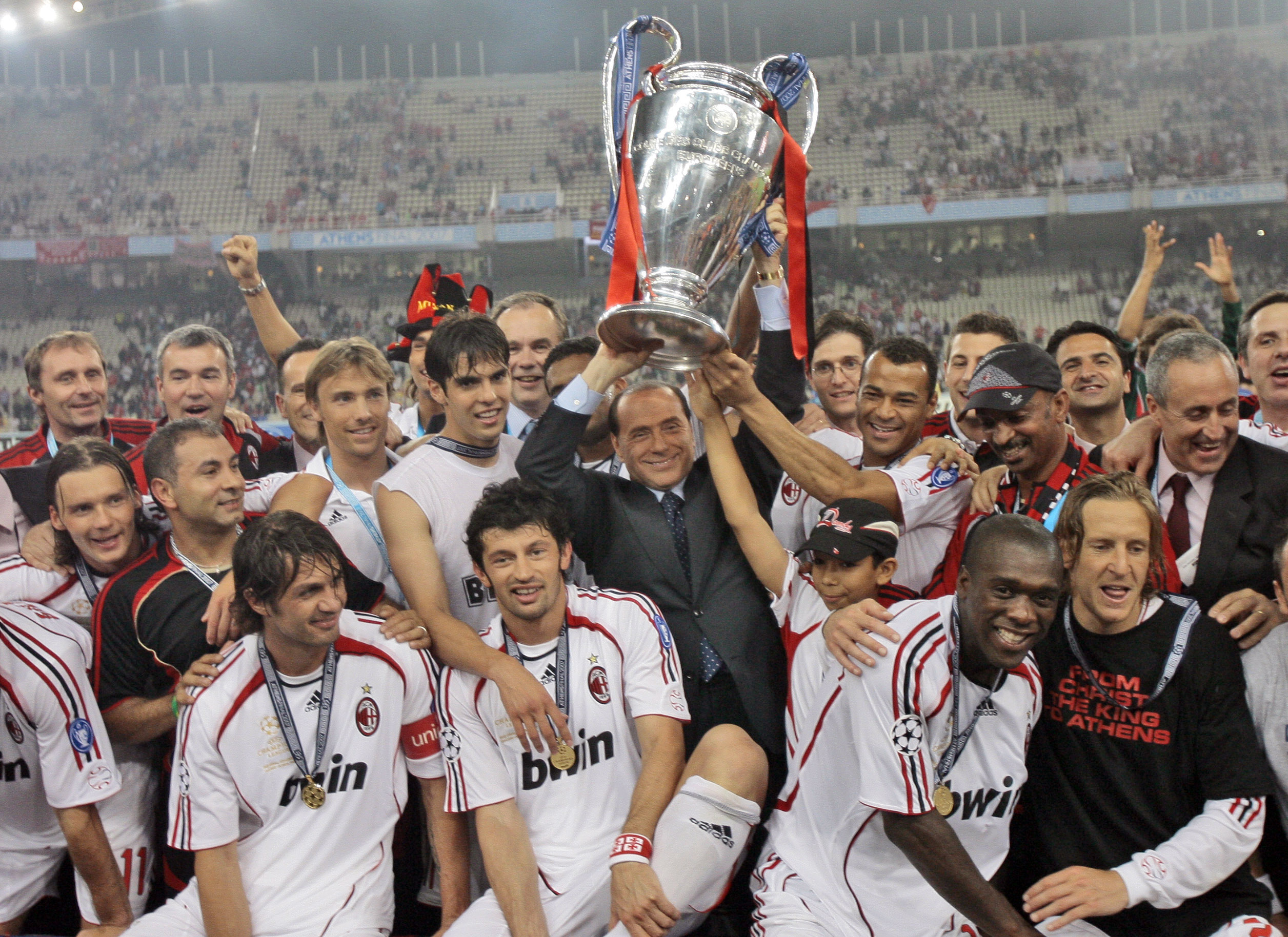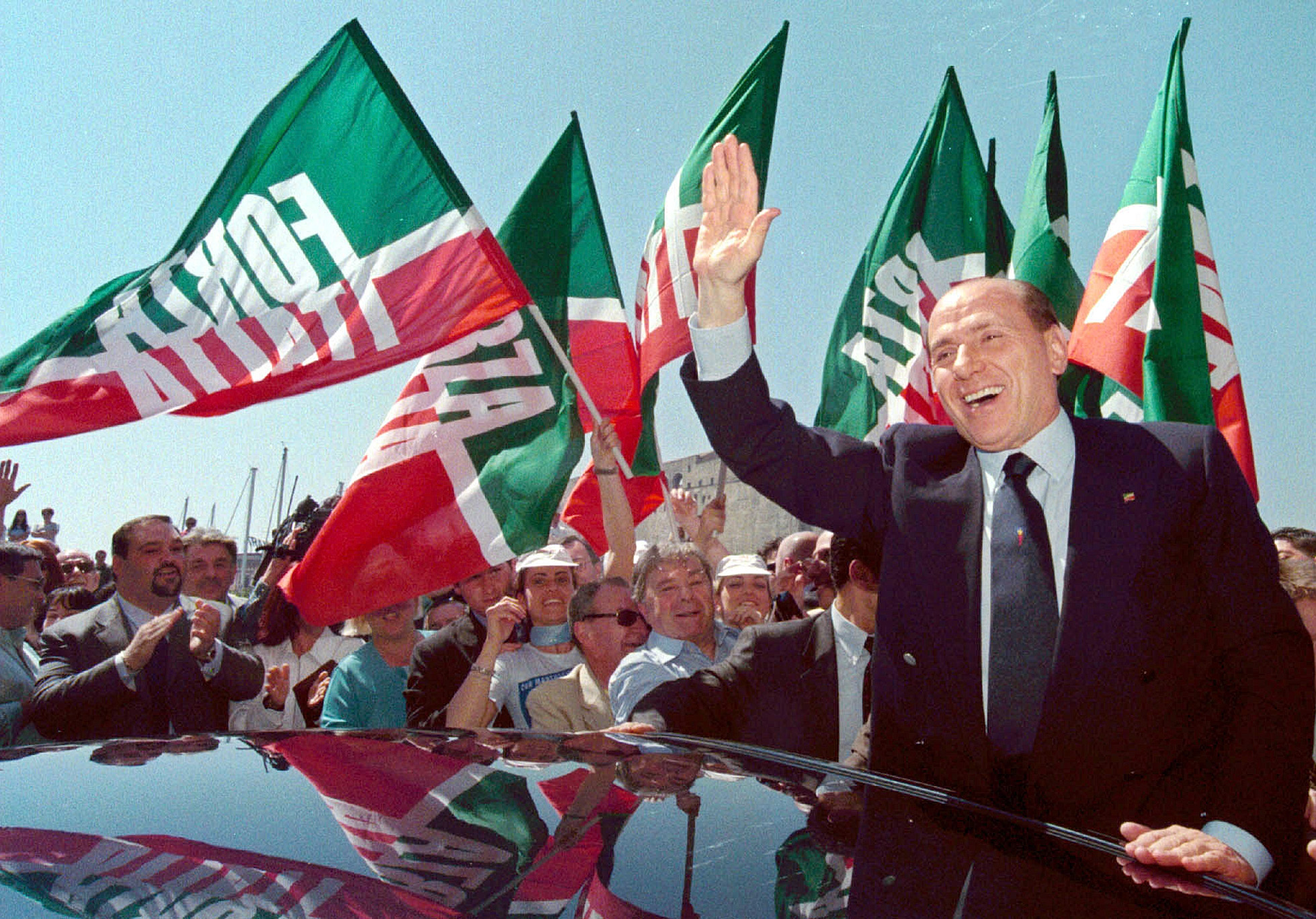
Marco van Basten seemed like he was close to tears. The former Dutch international was sitting in Ziggo Sport’s TV studio in the Netherlands alongside ex-teammate Ruud Gullit hours after the death of former Italian prime minister Silvio Berlusconi at the age of 86.
His political obituaries were already written; of how Berlusconi upended Italy’s political consensus, becoming the godfather of modern populism.
But the former Oranje stars were there to talk about his other legacy: as the man who changed AC Milan, and football, forever.
“He was a big businessman, he was a politician and I had a good relationship with him. I always enjoyed him,” said an emotional van Basten. “This is an important moment. Cruyff died, Maradona died, and I consider him [Berlusconi] also as a big person who has now left us.”
Van Basten and Gullit were part of AC Milan’s golden generation that dominated Italian and European football in the late ’80s and 1990s. And it was Berlusconi who triggered the Rossoneri revolution.
Back in 1986 Berlusconi, who had already made a fortune in real estate before turning to television, bought Milan when it was down on its luck. Instinctively, he knew that combining the glamour of TV with the passion of football would bring success, both on screen and in the trophy room.
“He had a knack for television that was innate,” said Gianni Riotta, a writer, broadcaster and former director of TG1, the flagship news programme on Italy’s public broadcaster, who had had several run-ins with Berlusconi over the years. “He knew TV and he brought to sport that show business that has always been there in the US. The TV cameras, the clash of colours, the cheerleaders. He brought that to soccer.”
Riotta recalled when Berlusconi began to build his private TV empire, a meeting was arranged between him and the late Italian philosopher and writer Umberto Eco, who was also a prominent media theorist and critic.
“[Berlusconi] came, and they spent a couple of hours together. He sent him a gift afterwards. And later [Eco] told me: ‘Berlusconi did the exact opposite of what I said. And he made billions.’”
Berlusconi went on to build Italy’s biggest private media group, Mediaset, but when he decided to buy AC Milan, it was not seen as a particularly sound investment. The club was bankrupt with crumbling infrastructure. Berlusconi changed all that.
“He took over the club in ’86 which was a terrible period of relegation, scandal, financial disaster, it was not a good time,” said John Foot, author of the bestselling, Calcio: A History of Italian Football.
“They win the Scudetto pretty quickly. There’s this entrepreneurial genius of taking someone like [Milan coach] Arrigo Sacchi, who literally nobody had ever heard of, and giving him carte blanche to completely reinvent football. It was literally a revolution on the pitch.”

Sacchi was a former shoe salesman who had never played professionally. But Berlusconi had been so impressed with the Parma side Sacchi coached when they played Milan in a cup tie that he hired him, much to the chagrin of Italy’s sport press who were convinced only a top player could be a top coach.
“I never realised that in order to become a jockey you have to have been a horse first,” was reportedly Saachi’s wry reply. Saachi transformed Milan from a traditional Italian defensive unit into a buccaneering, attack-minded side. It forced other teams to follow suit. He won the Scudetto in his first season and back-to-back European Cups in 1989 and 1990. The core of his team were the Dutch trio of Frank Rijkaard, Gullit and van Basten.
“Win and convince, that was his motto,” van Basten said of Berlusconi back in the Dutch TV studio. “He was a great lover of football. He really wanted to do big things. We got high bonuses if we won a championship, if we won the Champions League. But if we came second, we got nothing. He was very clear in that. That was beautiful. That was the mentality, to be number one.”
Berlusconi maintained that mentality when he went into politics, becoming prime minister in 1994 as head of his Forza Italia party.
A month after he was sworn into what would be the first of four terms as prime minister, Milan won its third European Cup, now rebranded as the Champions League, after beating Barcelona 4-0. The name Forza Italia was itself borrowed from a football chant. In Italy, he was known first and foremost as the man who brought Milan success.
“What made Berlusconi a household name was football, Milan, the Champions League,” said Riotta. “Scholars tend to underestimate this.”
Berlusconi’s political acumen and approach were drawn directly from the TV and football world.
“I think he is very, very important, not just politically, but as a cultural and sporting figure in 20th-century world history,” said Foot.
“Football is a language where you can speak to 26 million Italians, who declare themselves to be fans, they know what you’re talking about. So when he takes to the political field, he makes a speech full of football language. And then once you’ve got a team that’s winning, this is going get you kudos, and soft power. He understood all that stuff way before anyone else.”
Berlusconi’s rule was punctuated by polarisation, scandal, bunga bunga parties and surprising longevity. But his political legacy has also been felt across the world.
“He didn’t really have an ideology, he reinvented politics around the individual,” said Foot. “No party is needed. Slogans. Lying, and then contradicting yourself. It doesn’t matter what you say. Private life, personal and political life all mixed up. This all seems very familiar to us now because we’ve seen it with [former US President Donald] Trump and [former British Prime Minister Boris] Johnson. He was the prototype of it all. The sort of blueprint.”

Berlusconi was eventually embroiled in one too many sex and corruption scandals. He was banned from office over a tax scandal in 2013, although he was later elected a member of European Parliament in 2019 when the ban ended.
Under Berlusconi, AC Milan won an astonishing 29 titles in 31 years, including five Champions Leagues. He sold the club in 2017 to Chinese investors for 740 million euros (then $788m). Milan have since won only one Serie A title and no European silverware, while Berlusconi moved on to bankroll AC Monza who won promotion to Serie A in 2022.
The response to Berlusconi’s death, according to Riotta, has been surprisingly magnanimous.
“He was popular and you will see, check out the [state] funeral service at the Duomo in Milan. It will be full of the elite, of course. But outside, it will be the common Milanese people … they will realise an age is passing.”
Berlusconi divided opinion in life, but has united it in death, at least for now. After all, his passing also heralds the end of a nostalgic era.
“I think in football, he will be the last of the great Italian entrepreneurs that could afford to run a team,” believed Riotta. “The guy who puts his own money in the team. Hires his own coach. Buys the best players. He doesn’t have a budget to keep. When the team goes into the red, he goes into his pocket and puts them in the black.”
Today, football has become increasingly dominated by state-backed clubs like Manchester City and PSG, with Saudi-owned Newcastle United also on the rise. Manchester United might well be next.
Manchester City have just won the Champions League – the first time a team from the new generation of state-backed clubs has won football’s most prestigious prize – a prize Berlusconi knew the worth of only too well.
The likes of AC Milan, Inter and Barcelona, all considered European royalty in the past, have struggled to compete in this age. But Berlusconi can also, paradoxically, be considered the man who opened the door to this new world in the first place; as modern football’s first owner.
“We can say he was the last of the old breed, but at the same time, the first of the new breed,” said Riotta. “He was a transitional figure.”
Additional reporting by Mitra Nazar.







